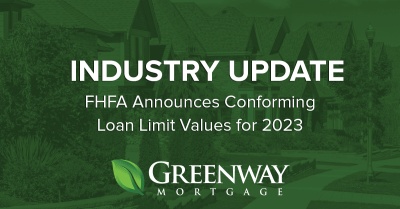Conforming Loan Limits Increase for 2023

On November 29, 2022, the Federal Housing Finance Agency (FHFA) announced an increase in the maximum conforming loan limits for mortgages acquired by Fannie Mae and Freddie Mac in 2023.
The maximum loan limit for one-unit properties will be $726,000, an increase from $79,000 from $647,200 in 2022. Release.
The decision was based on the recovery of housing prices under the Housing and Economic Recovery Act of 2008 (HERA). They require that the baseline conforming loan limit be adjusted each year for Fannie Mae and Freddie Mac to reflect the change in the average U.S. home price.
FHFA third quarter 2022 House Price Index (HPI) reported that house prices increased 21.21%, on average, between the third quarters of 2021 and 2022. The baseline maximum conforming loan limit in 2023 will increase by the same percentage.
For areas in which 115 percent of the local median home value exceeds the baseline conforming loan limit, the maximum loan limit will be higher than the baseline loan limit.
A list of the 2023 maximum conforming loan limits for all counties and county-equivalent areas in the country can be found here.
Contact your Greenway Mortgage loan officer today for more details about how the increase can impact you.


|
|
|

|
|
|
NJ Conventional Down Payment Assistance Program Increases To $15,000

Now home buyers can dream even bigger! The New Jersey Conventional Down Payment Assistance (DPA) Program has increased to $15,000 for properties in certain New Jersey counties*. This program was created to provide first-time home buyers a flexible and affordable option for purchasing a home.
What Does This Change Mean for Home Buyers?
Now, qualified clients can receive $15,000 to be used towards the down payment and closing with affordable mortgage insurance premiums that follows conventional mortgage guidelines.
About The NJ Conventional DPA Program:
- 30-year, Fixed-Rate Conventional Loan
- Affordable Mortgage Insurance Premiums
- $15,000 for Down Payment and Closing Costs*
Do You Qualify for the New Jersey Conventional Down Payment Assistance Program?
-
First-time buyers are borrowers that have not had an ownership interest in their primary residence during the previous three years.
-
DPA is a $15,000 forgivable loan with no interest and no monthly payments. Forgiven after 5 years as primary residence (While grant funds are available).
-
Single-Family Properties and Condos, Owner Occupied, Primary Residence in NJ, Minimum FICO 620
-
Income limits are determined by the county of the purchase property but must not exceed 80% of Area Median Income. Please reference the Freddie Mac HFA Income Limits for additional details.
County List:
-
*$15,000 applies to: Bergen, Essex, Hudson, Hunterdon, Mercer, Middlesex, Monmouth, Morris, Ocean, Passaic, Somerset, and Union. Effective November 1, 2022.
-
$10,000 applies to: Atlantic, Burlington, Camden, Cape May, Cumberland, Gloucester, Salem, Sussex, Warren.
Bottom Line
We are here to help make homeownership a reality for you. Reach out today to learn more or to see if you qualify for the NJ Conventional Down Payment Assistance Program.
Resources:


|
|
|

|
|
|

Reverse mortgages, available to qualifying homeowners ages 62+, generally come with no limits on the use of the funds.
Reverse mortgage funds are first used to pay any liens on the home, including a regular mortgage or home equity loan. In some cases, a portion of proceeds is withheld or set aside to pay taxes and insurance.
Remaining funds often:
- Offset day-to-day living expenses.
- Cover emergency expenditures, such as car or home repairs.
- Pay for medical costs.
- Provide for in-home care, allowing the owner to remain in their own home longer.
Sometimes, homeowners use a reverse mortgage just to pay off their existing loan. They do not access the remaining funds at all, but they remove the strain of a monthly mortgage payment* from their budget and increase their cash flow.
Some seniors use reverse mortgages to purchase a new home without ever incurring a monthly payment.*
Remember that a reverse mortgage is a loan that will be repaid after your death, after you permanently leave your home, or after the sale of your home. Neither you nor your heirs will be responsible for repaying more than the value of your home at sale.
How Do You Qualify for a Reverse Mortgage?
To be eligible for a reverse mortgage, you must be age 62 or older. You must either own your home outright, or the balance must be low enough that it can be paid off at closing. Borrowers are required to receive free or low-cost information from an HECM counselor prior to obtaining the loan. The goal of the counseling session is to make sure that potential borrowers fully understand and are comfortable with the process and the loan terms.
The ability to pay property taxes, insurance, etc. is determined prior to approval. Single-family homes, condos, townhouses, manufactured homes built after June 1976, and 2-4 unit properties are eligible for a reverse mortgage. A co-op does not qualify. The homeowner is still responsible for property taxes, homeowners insurance, upkeep and any relevant HOA fees.
Contact Us To See If You Qualify!
If you would like to explore the opportunities a reverse mortgage may present for you or your family, contact us!


.png)




